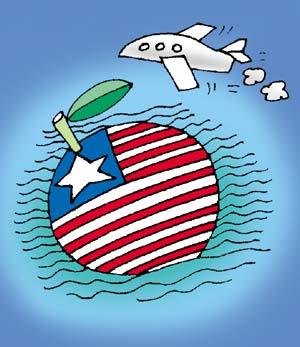
The admission letters have started coming in, and you have crossed the first hurdle to study in the United States. But you are still not on home base.
The dreaded 'student visa' interview is pending, and given that there's no guarantee you will be granted a visa, you are understandably worried. Preparing for the interview will improve your confidence levels and in turn, your chances for success.
Visa categories
Foreign citizens who wish to study or participate in an exchange programme in the United States need to apply for a non-immigrant visa. A non-immigrant is someone who is admitted to the US temporarily, for a specific purpose; who fully intends to return to the host country upon completion of that purpose.
The United States issues different types of visas to non-immigrants. Students heading to the United States to pursue full-time academic studies are usually admitted in the F-1 category, which includes academic students in colleges, universities, seminaries, conservatories, academic high schools, other academic institutions, and in language training.
People who will be participating in an exchange visitor programme in the US need to apply for the "J" visa. Students, who want to study or train at non-academic institutions such as vocational schools, need to apply for an M-visa. This article focuses on the F-1.
The Immigration and Nationality Act defines the F-1 non-immigrant alien as one who has not abandoned his residence in a foreign country and who is a bona fide student coming temporarily and solely to the United States to pursue a course of study at a recognised institution of education.
Illustration: Rediff Archives

The US immigration law requires consular officers to view every visa applicant as an intended immigrant until the applicant proves otherwise. Hence, please note that admission to a US school does not guarantee a visa! The onus of proving that you are a bona fide student and plan to return to your country upon completion of the programme lies on you during the interview. All F-1 applicants must appear for an interview as they are required to submit two electronic fingerprint impressions.
Facing the interview
You are not allowed to take anyone with you for the interview. For many students, this is a first interview and hence a daunting process. Being well-informed of the process is extremely important. The officer who interviews you is highly trained and has at his or her disposal only the facts that you furnish.
No one can read your mind or guess your intent so it is critical that you be alert and answer questions with confidence and support your assertions with appropriate documents. However, it is not the documents alone that will get you a visa. Had that been the case, you would submit your application with supporting documents, get fingerprinted and leave!
Be prepared to demonstrate the following...
Academic preparation for the programme of your choice. This is demonstrated by the relevance of your preparation to the course you plan to pursue in the US and by taking the tests that different US academic programmes require.
Your financial capability to pay for your academic and other expenses in the US for the entire length of the proposed study period. The consular officer requires credible documentary evidence of readily available funds to defray all expenses. A US education is rather expensive so you must be prepared to explain how you will pay for it.
Evidence of English proficiency. This is mostly done by taking the TOEFL, however, of late, many institutions have started waiving off this requirement for Indian students who demonstrate this proficiency through their marks.
Your ties (professional, financial, social) to India; your long-term career goals and how the US education will help you in pursuing it, will help in establishing credentials. You will be spending a lot of money for this education, especially in comparison to pursuing the same degree in India. Please justify why this education is so critical.

You cannot apply for a student visa more than 120 days before the start of the academic programme.
Your passport must be valid for at least six months after your proposed date of entry into the US.
You are not allowed to arrive in the US more than 30 days before the start of your programme.
As individual situations vary, two students applying for the same visa may be asked different questions and for different documents.
Your visa interview will typically last for five minutes but can go up to 15 minutes. Emphasis is paid on what and how you answer questions rather than any papers that you are carrying. However, show supporting documents.
Be forthcoming in the interview. May, June, July, and August are the busiest months in most consular sections. So begin early and be prepared.

What is an I-20 Form?
Form I-20 is a government form that is issued by the educational institutes once you are admitted to an approved programme. This is the document that is carried for the visa interview. It tells the US government that you are eligible for F-1 student status.
What is SEVIS?
SEVIS (Student and Exchange Visitor Information System) is a mechanism for electronic verification of prospective student status. All I-20s issued by academic and vocational educational institutions are created within this system and this information is then accessed by US consulates worldwide. There is a one-time SEVIS fee which is separate from and in addition to the visa application fee.
My visa was refused. Can I reapply?
You can apply again. Technically there is no limit to the number of times you can apply for a visa but it is a good idea to reapply only if you are in possession of fresh facts that indicate a change in your status.
I have been granted a visa for school "A" and now I wish to attend school "B". What should I do?
You will need to go back to the embassy and apply for a visa for school "B".
Can I work in the United States on an F-1 visa?
You may work up to 20 hours a week on-campus. During holidays, you may be allowed to work full-time (40 hours per week) on campus. You may not accept off-campus employment at any time during the first year of study; however, you could seek permission to accept off-campus employment after nine-months; either as curricular or practical training (cooperative programmes).
How long may I stay on my F-1 student visa?
You are usually admitted for "Duration of Study". This means you may stay as long as you are a full-time student, even if the F-1 visa in your passport expires.
Can I travel outside the United States?
A multiple entry visa means that you can exit and re-enter the United States for any number of times within the duration of the visa. However, before leaving the US, get your International Student Advisor to validate your current student status on your I-20.
You can expect to be readmitted after absences of five months or less provided you are enrolled in the programme, your visa is valid and are carrying their validated I-20 form.
Can I apply for any practical training in the US after I graduate?
Students on an F-1 visa may apply for up to 29 months (conditions apply) of practical training related to their field of study after they complete their studies provided they have been an F-1 student for at least nine months. Please consult your International Student Advisor for the same.
Illustration: Rediff Archives